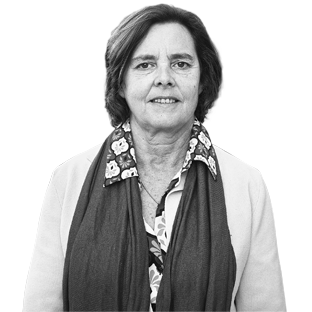Nils Johansson: The panties are everyday environmental heroes

We are often met by tragic stories about the mushrooms in the global south. The soup caps generally belong to the poorest segment, and live outside society, on and of the huge amounts of garbage generated in the world’s mega cities. For example, the Christian minority in Cairo, Zabbaleenwhich faithfully collects garbage bags from the multi -million town’s exterior doors and then sorting the waste at home in its neighborhood.
The soup watches’ efforts can hardly be underestimated. In many cities, the waste would not be collected at all if it was not for the informal efforts. Without the mushrooms, the watercourses would be put back, pollution and debris spread with growing health problems. In the cities where the formal and informal waste systems work in symbiosis, such as in Cairo, the soup caps often surpass the official systems’ recycling rate with horse lengths. In several countries in the Global South, the mushrooms have been organized in cooperatives for their work to be recognized and compensated.
In the global north, On the other hand, soup watches are mainly seen as a historical phenomenon. Swedish environmental historian Ylva Sjöstrand has described how soup capers during the 19th century were as widespread in the north as in the south. Since at least the 18th century, there have been documented cases of lump collectors who wandered through Sweden, often dragging on a cart. They were in search of worn and consumed textiles; Everything from bedding to everyday clothes of cotton, wool or linen. Unlike today, when the new collection requirements lead to an abundance of clothing waste that we do not know what to do, were old, consumed textiles in the past a deficiency and worthy gold. Previously, paper was produced exclusively by just old textiles; Lump.
The Swedes’ relationship with the lump collectors was ambivalent. On the one hand, the lump collectors were indispensable for the raw material supply of the paper industry. The Swedish households were required by law to submit their old rags. Therefore, the visits’ visits were often welcome, as they gave a receipt in return for households to show at the upcoming parish meeting. On the other hand, the flanked lives of the lump collectors were considered disturbing, because they lacked a given parish and broke against the norm of the time; to use the earth.
The return of the informal recovery indicates that parts of both the cycle community and poor Sweden are on their way back
The lump collectors often belonged to the traveling people, occurred in the loose driver protocols and compensation was so limited that they were forced to beg. When cholera and anthrax spread in Sweden in the 19th century, the suspicions were directed at the lump as a spreader, which led to the trade being limited.
To limit the lump trade became possible because the production process of paper from the middle of the 19th century switched to cellulose, forest mass, as raw material. As paper production developed from a needlework to machine production, access to lump was considered too uncertain. Thanks to the railway expansion in Sweden during the 19th century, raw materials were simultaneously transported to the factories from long-distance areas, which reduced the need to recycle to get raw material. The disadvantage, however, was that the quality of the new cellolus -based paper deteriorated, compared to the lump paper. Swedish technology historian Helene Sjunnesson notes in his dissertation « Paper of Lump » (2006) that when particularly high quality was required for pressure by, for example, banknotes were still used long into the 20th century.
However, modernization, centralization, and the municipal waste monopoly during the 20th century, made it difficult for the informal recycles to operate in our communities. But today it is difficult to turn a blind eye to the growing army of informal recycles who seek out the garbage baskets. The informal recovery’s return indicates that parts of both the cycle community and poor Sweden are on their way back.
Like the old lump collectors, today’s pledgee focuses on a single category of waste: beverage packaging with the pledge symbol. As a result, the mushroom caps in Sweden differ from their counterparts in the south that focus on all possible waste. This is partly because the recycling industry in Sweden rarely purchases waste from individuals, especially if they lack a bank account. The mortgage machines, on the other hand, do not ask for identification.
Business economist Sabina du Rietz has pointed out that this creates a unique opportunity for informal recycling: it does not have to be the same person who pays the mortgage position who then gets it back. As a rule, households collect the mortgage at home, just like other waste. But all beverage packaging that is consumed outside the homes usually falls into the municipal trash cans, available to anyone.
Furthermore, the advantage of picking a mortgage object is that compensation is predetermined and does not fluctuate like the market value for other recyclable waste. The pledge symbol makes it easy to assess the value of each object, and the mortgage machine handles all sorting. In addition, empty mortgage cans and plastic bottles are easy to transport, which means that pledges do not need shopping carts or carts, which are common among mushrooms on the streets in other countries. If there is something that characterizes the pledges, it is precisely their speed and silentness. Long -sleeved, equipped with a grip pliers and a bag is traversed the urban environment rhythmically, often on foot, in recurring rounds, adapted to the time just before the city’s garbage baskets are emptied.
For most people constitute the pledge their only source of income, while for others it is a necessary extra income
The working days for the mortgage pickers are long and tiring. Most days require six hours of work to obtain a day income of around SEK 100, but sometimes the working day can extend up to fourteen hours. The long hikes and constant diving in the garbage cans cause most of the picks to develop knee and back problems. As competition increases if the vital panty objects are also facing the pledge picks, more and more violence and threats. In order to flee internal competition, many pledges are looking for new sources, such as the recycling stations.
Those who pick pledgejust like other garbage in the global south, is part of society’s most vulnerable groups such as ethnic minorities, paperless migrants, pensioners and homeless. For most people, the mortgage is their only source of income, while for others it is a necessary extra income. The writer Irina Bagley, himself a mortgage picker, describes in social policy (8/7 2024) how she sees people who gather pledge on their way to and from work, and asks if this is because « wages are not enough » and if the companies thereby produce poverty?
Most people collect a pledge for income, but some do so for the sake. These, often born in Sweden, are described in the media as environmental heroes or pledge kings, while those who collect a mortgage for survival, often born outside Sweden, are seen as victims as soon as possible, even as part of organized crime.
Reducing mortgage pickers to victims makes it difficult to see their great environmental benefit. Their work means regardless of motive that plastic and aluminum, which would otherwise have gone to incineration via the municipal garbage, be redirected to recycling. In addition, they focus not only on mortgage objects in the trash cans, but also on those lying on scraps. Common to the pledges in the north and the mushrooms in the south is thus that they address deficiencies in the formal waste systems.
Another important resemblance to the mushrooms in the south is that the pledges in the north are invisible in public documents and are not compensated for the work to increase recycling, reduce the debris and keep the city well. The pledge pickers are only replaced per item returned to the system. In addition, many grocery stores in the cities have limited the number of objects that can be pledged at a time, and replaces the mortgage only with a credit receipt in the store. This example shows how the return system has been adapted to the store’s customers, rather than the pledges, which are excluded. Some municipalities in Stockholm County counteract and criminalize even the pledges, for example by banning mortgage collection at recycling stations.
If vulnerable people can support themselves on the margin through mortgage revenue, the pressure on politicians may decrease
The role distribution in The mortgage system highlights society’s social injustice; Those who can afford throw the mortgage, which the poor in fierce competition root forward. Return pack plans to raise the mortgage in 2025. Thereby fewer can be able to afford to disregard the mortgage. At the same time, the change can strengthen the pledge’s financial independence and reduce their dependence on both crime and social protection networks.
But there is a back side. British sociologist Graham Riches has warned that the informal economies can lead to the state abdicating from its social responsibility for weak groups and impairing non -profit actors’ ability to reach them. If vulnerable people can support themselves on the margin through mortgage income, the pressure on politicians can reduce social reforms that address the basic causes of poverty and vulnerability.
This double invisibility, both in terms of their lack of formal recognition and the independence of the formal social systems that arise through the mortgage income, indicate that pledges in Sweden need a stronger voice. A spokesperson could, through a cooperative organization similar to those that occur, especially Latin America, could demand full recognition and compensation, not only for the collected jars but also for their work and environmental benefits. This could, for example, be financed through the mortgage deposit that is paid, but never collected, and which today goes to return pack and corresponds to more than SEK 300 million per year.
Research on mortgage systems at the Royal Institute of Technology in Stockholm.
Read more:
« Pensioners should not have to collect a mortgage »
Vesna Prekopic: Why isn’t the growing poverty seen as a problem?




:format(webp)/s3/static.nrc.nl/images/gn4/stripped/data133280221-bb4cba.jpg)


